May 2023
Plant-Based Foods and Gout
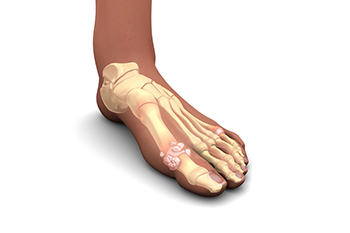
Gout is a particular kind of foot affliction that is essentially a form of inflammatory arthritis. In particular, gout is often characterized by pain in the joints of the feet. There are specific types of foods that are either good or bad for increasing the risk of gout. Importantly, plant-based foods can decrease the risk of triggering a gout attack. The reason for this is that plant-based foods are especially low in purines. There are many different types of plant-based foods. The list includes beans, seeds, nuts, vegetables, and whole grains. If you are someone that has gout attacks, it is suggested that you schedule an appointment with a podiatrist who can help you to find relief and manage this painful condition.
Gout is a foot condition that requires certain treatment and care. If you are seeking treatment, contact Genine Befumo, DPM from University Foot and Ankle Center, L.L.C. Our doctor will treat your foot and ankle needs.
What Is Gout?
Gout is a type of arthritis caused by a buildup of uric acid in the bloodstream. It often develops in the foot, especially the big toe area, although it can manifest in other parts of the body as well. Gout can make walking and standing very painful and is especially common in diabetics and the obese.
People typically get gout because of a poor diet. Genetic predisposition is also a factor. The children of parents who have had gout frequently have a chance of developing it themselves.
Gout can easily be identified by redness and inflammation of the big toe and the surrounding areas of the foot. Other symptoms include extreme fatigue, joint pain, and running high fevers. Sometimes corticosteroid drugs can be prescribed to treat gout, but the best way to combat this disease is to get more exercise and eat a better diet.
If you have any questions please feel free to contact our office located in Monroe Township, NJ . We offer the newest diagnostic and treatment technologies for all your foot and ankle needs.
Why Do Feet Fall Asleep During Pregnancy?
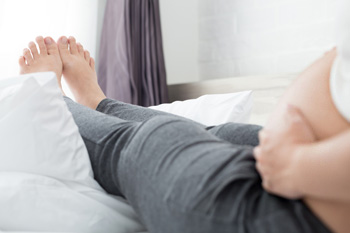
During a woman’s pregnancy, she might notice that her feet fall asleep frequently. In other words, she might notice that her feet often experience numbness or a pins-and-needles feeling. This is actually not an uncommon symptom that results from pregnancy. In fact, many women can experience this feeling in the feet at night or immediately upon waking in the morning. The reason why pregnancy can cause numbness in the feet is due to the fact that pregnancy can lead to nerve compression in this area. If you are someone that is pregnant or planning to be, it is suggested that you contact a podiatrist today. This foot specialist will be able to help the pregnant woman navigate feelings of numbness in the feet.
Pregnant women with swollen feet can be treated with a variety of different methods that are readily available. For more information about other cures for swollen feet during pregnancy, consult with Genine Befumo, DPM from University Foot and Ankle Center, L.L.C. Our doctor will attend to all of your foot and ankle needs.
What Foot Problems Can Arise During Pregnancy?
One problem that can occur is overpronation, which occurs when the arch of the foot flattens and tends to roll inward. This can cause pain and discomfort in your heels while you’re walking or even just standing up, trying to support your baby.
Another problem is edema, or swelling in the extremities. This often affects the feet during pregnancy but tends to occur in the later stages.
How Can I Keep My Feet Healthy During Pregnancy?
- Wearing orthotics can provide extra support for the feet and help distribute weight evenly
- Minimize the amount of time spent walking barefoot
- Wear shoes with good arch support
- Wear shoes that allow for good circulation to the feet
- Elevate feet if you experience swelling
- Massage your feet
- Get regular, light exercise, such as walking, to promote blood circulation to the feet
If you have any questions please feel free to contact our office located in Monroe Township, NJ . We offer the newest diagnostic and treatment technologies for all your foot and ankle needs.
Plantar Warts Can Be Treated!
The Right Shoes to Wear for Arthritis
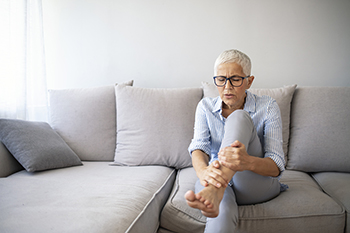
Arthritis is an inflammatory disease that causes pain in the joints. Because each foot consists of 33 joints that can become inflamed, it may be helpful to find shoes that help to provide some relief from arthritic foot pain. Experts recommend wearing a shoe with a sturdy sole, as those with a softer sole may increase the pressure on the heel with each step. It is beneficial to look for a shoe that bends only near the toes and does not fold in half when squeezed. Further, avoiding shoes with narrow or pointed-toe boxes is thought to be the best choice. In addition, shoes with removable insoles are recommended, as this can make it easier to add custom insoles if needed. These inserts can support weakened joints, improve mobility, and reduce pain. High-heeled shoes or flats are not recommended for people with arthritis. Instead, finding shoes with a slight incline from toe to heel is thought to be better. For more information on selecting footwear for arthritic feet, it is suggested that you consult a podiatrist.
Arthritis can be a difficult condition to live with. If you are seeking treatment, contact Genine Befumo, DPM from University Foot and Ankle Center, L.L.C. Our doctor can provide the care you need to keep you pain-free and on your feet.
Arthritic Foot Care
Arthritis is a joint disorder that involves the inflammation of different joints in your body, such as those in your feet. Arthritis is often caused by a degenerative joint disease and causes mild to severe pain in all affected areas. In addition to this, swelling and stiffness in the affected joints can also be a common symptom of arthritis.
In many cases, wearing ill-fitting shoes can worsen the effects and pain of arthritis. Wearing shoes that have a lower heel and extra room can help your feet feel more comfortable. In cases of rheumatoid arthritis, the arch in your foot may become problematic. Buying shoes with proper arch support that contour to your feet can help immensely.
Alleviating Arthritic Pain
- Exercises that stretch the foot can prevent further pain and injury and increase mobility
- Most of the pain can be alleviated with anti-inflammatory drugs, heat, and topical medications
- Massages can help temporarily alleviate pain.
It is best to see your doctor for the treatment that is right for your needs and symptoms. Conditions vary, and a podiatrist can help you determine the right method of care for your feet.
If you have any questions, please feel free to contact our office located in Monroe Township, NJ . We offer the newest diagnostic tools and technology to treat your foot and ankle needs.
Cracked Heels and Vitamin Deficiencies
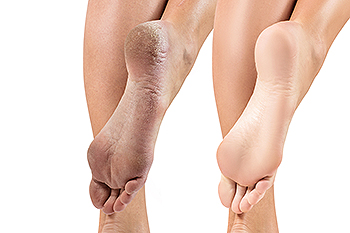
Having a vitamin deficiency may be a cause for cracked heels to develop. It can be an unsightly and uncomfortable foot condition. Mildly cracked heels affect the top layer of the skin, and it is generally a painless ailment. Fissures are defined as severely cracked heels that may bleed and become infected. Studies show that a lack of vitamin E may affect the collagen in the skin. This is linked to the drying effect that aging has on the skin and may increase the risk of developing cracked heels. It can be beneficial to add foods, such as sunflower seeds, salmon, and avocado to your diet, which are laden with vitamin E. Patients who do not get adequate amounts of vitamin B-3 in their diet may notice their skin becomes dry and scaly, which may be followed by getting cracked heels. If you have questions about how cracked heels are connected to vitamin deficiencies, it is suggested that you speak with a podiatrist.
Cracked heels are unsightly and can cause further damage to your shoes and feet. If you have any concerns, contact Genine Befumo, DPM from University Foot and Ankle Center, L.L.C. Our doctor can provide the care you need to keep you pain-free and on your feet.
Cracked Heels
Cracked heels appear unappealing and can make it harder for you walk around in sandals. Aside from looking unpleasant, cracked heels can also tear stockings, socks, and wear out your shoes. There are several methods to help restore a cracked heel and prevent further damage.
How Do You Get Them?
Dry skin is the number one culprit in creating cracked heels. Many athletes, walkers, joggers, and even swimmers suffer from cracked heels. Age and skin oil production play a role to getting cracked heels as well.
Promote Healing
Over the counter medicines can help, especially for those that need instant relief or who suffer from chronic dry feet.
Wear Socks – Wearing socks with medicated creams helps lock in moisture.
Moisturizers – Applying both day and night will help alleviate dryness which causes cracking.
Pumice Stones – These exfoliate and remove dead skin, which allows for smoother moisturizer application and better absorption into the skin.
Change in Diet
Eating healthy with a well-balanced diet will give the skin a fresh and radiant look. Your body responds to the kinds of food you ingest. Omega-3 fatty acids and zinc supplements can also revitalize skin tissue.
Most importantly, seek professional help if unsure how to proceed in treating cracked heels. A podiatrist will help you with any questions or information needed.
If you have any questions, please feel free to contact our office located in Monroe Township, NJ . We offer the newest diagnostic and treatment technologies for all your foot care needs.
Sports Podiatrists
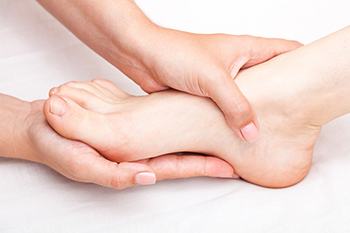
Podiatrists are foot specialists that are specially trained in addressing different afflictions of the feet. They are trusted medical professionals who can treat a range of various foot conditions, from plantar fasciitis to hammertoe. It is important to note there are different types of podiatrists who may specialize in specific areas in the field of podiatry. For example, one such kind of podiatrist is known as a sports podiatrist. As the name suggests, this type of podiatrist works primarily with athletes and those who engage in sports. A sports podiatrist is well-versed in understanding, recognizing, and treating the nuances of foot injuries in the context of sports. Some of these sports podiatrists are engaged in producing research in their field. These podiatrists are easily able to identify the foot afflictions that most affect athletes. To learn more about the different types of podiatrists available to help you address any foot problems, it is suggested that you schedule an appointment with a podiatrist today.
If you are experiencing pain in the feet or ankles, don’t join the stubborn majority refusing treatment. Feel free to contact Genine Befumo, DPM from University Foot and Ankle Center, L.L.C. Our doctor can provide the care you need to keep you pain-free and on your feet.
What Is a Podiatrist?
Someone would seek the care of a podiatrist if they have suffered a foot injury or have common foot ailments such as heal spurs, bunions, arch problems, deformities, ingrown toenails, corns, foot and ankle problems, etc.
Podiatric Treatment
A podiatrist will treat the problematic areas of the feet, ankle or lower leg by prescribing the following:
- Physical therapy
- Drugs
- Orthotic inserts or soles
- Surgery on lower extremity fractures
A common podiatric procedure a podiatrist will use is a scanner or force plate which will allow the podiatrist to know the designs of orthotics. Patients are then told to follow a series of tasks to complete the treatment. The computer will scan the foot a see which areas show weight distribution and pressure points. The podiatrist will read the analysis and then determine which treatment plans are available.
If you have any questions please feel free to contact our office located in Monroe Township, NJ . We offer the newest diagnostic and treatment technologies for all your foot and ankle needs.
Blog Archives
- April 2024
- March 2024
- February 2024
- January 2024
- December 2023
- November 2023
- October 2023
- September 2023
- August 2023
- July 2023
- June 2023
- May 2023
- April 2023
- March 2023
- February 2023
- January 2023
- December 2022
- November 2022
- October 2022
- September 2022
- August 2022
- July 2022
- June 2022
- May 2022
- April 2022
- March 2022
- February 2022
- January 2022
- December 2021
- November 2021
- October 2021
- September 2021
- August 2021
- July 2021
- June 2021
- May 2021
- April 2021
- March 2021
- February 2021
- January 2021
- December 2020
- November 2020
- October 2020
- September 2020
- August 2020
- July 2020
- June 2020
- May 2020
- April 2020
- March 2020
- February 2020
- January 2020
- December 2019
- November 2019
- October 2019
- September 2019
- August 2019
- July 2019
- June 2019
- May 2019
- April 2019
- March 2019
- February 2019
- January 2019
- December 2018
- November 2018
- October 2018
- September 2018
- August 2018
- July 2018
- June 2018
- May 2018
- April 2018
- March 2018
- February 2018
- January 2018
- December 2017
- November 2017
- October 2017
- September 2017
- August 2017
- July 2017
- June 2017
- May 2017
- April 2017
- March 2017
- February 2017
- January 2017
- December 2016
- November 2016
- October 2016
- September 2016
- August 2016
- July 2016
- June 2016
- May 2016
- April 2016
- March 2016
- February 2016
- January 2016
- December 2015
- November 2015
- October 2015
- September 2015
- August 2015
- July 2015
- June 2015
- May 2015
- April 2015
- March 2015
- February 2015
- January 2015
- December 2014
- November 2014
- October 2014
- September 2014
- August 2014
- July 2014





